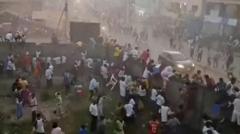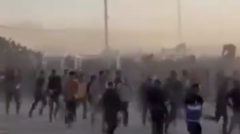Reports indicate a devastating crush at a football stadium in Guinea, resulting in an estimated 135 deaths, primarily affecting children, raising serious questions regarding safety measures.
Tragedy Strikes as Stadium Crush Claims Over 135 Lives in Guinea

Tragedy Strikes as Stadium Crush Claims Over 135 Lives in Guinea
Human rights groups express concerns over casualty figures following a football match disaster in Nzérékoré.
The human rights organizations in Guinea are asserting that more than 135 individuals lost their lives during a tragic stadium crush on Sunday, with a significant number believed to be children. This unverified figure starkly contrasts with the official count of 56 deaths released by the government. Sources for the higher estimate include hospitals, cemeteries, eyewitness accounts, and family reports indicating that over 50 individuals remain unaccounted for.
The military government has cautioned the public against disseminating "unverified" information, asserting that investigations are actively underway into the incident that unfolded in Nzérékoré, Guinea's second-largest city. Justice Minister Yaya Kaïraba Kaba mentioned that a judicial inquiry would be launched against those deemed responsible for the tragedy.
The chaos ensued following a contentious refereeing decision during the football match, which ignited violence inside the stadium. As chaos erupted, police resorted to using tear gas to control the situation, causing further panic among the audience trying to flee. The rights organizations have reported that the deaths resulted from both the overcrowding and poor organizational practices by the game's organizers and the military junta, who hosted the event in honor of President Mamady Doumbouya.
In response to the catastrophe, Prime Minister Mamadou Oury Bah declared three days of national mourning for the affected individuals. A government spokesperson emphasized the importance of mourning while clarifying that the reported figures are not finalized, acknowledging the need for an accurate account of the tragedy.
Witness accounts suggest the stadium was overcapacity, with reports indicating that only one small exit was available for crowds trying to escape. This unfortunate incident sheds light on the ongoing challenges facing Guinea concerning sports safety regulations, as the country, along with others such as Ethiopia and Sierra Leone, faces bans from hosting international football matches due to non-compliance with international standards.
The military government has cautioned the public against disseminating "unverified" information, asserting that investigations are actively underway into the incident that unfolded in Nzérékoré, Guinea's second-largest city. Justice Minister Yaya Kaïraba Kaba mentioned that a judicial inquiry would be launched against those deemed responsible for the tragedy.
The chaos ensued following a contentious refereeing decision during the football match, which ignited violence inside the stadium. As chaos erupted, police resorted to using tear gas to control the situation, causing further panic among the audience trying to flee. The rights organizations have reported that the deaths resulted from both the overcrowding and poor organizational practices by the game's organizers and the military junta, who hosted the event in honor of President Mamady Doumbouya.
In response to the catastrophe, Prime Minister Mamadou Oury Bah declared three days of national mourning for the affected individuals. A government spokesperson emphasized the importance of mourning while clarifying that the reported figures are not finalized, acknowledging the need for an accurate account of the tragedy.
Witness accounts suggest the stadium was overcapacity, with reports indicating that only one small exit was available for crowds trying to escape. This unfortunate incident sheds light on the ongoing challenges facing Guinea concerning sports safety regulations, as the country, along with others such as Ethiopia and Sierra Leone, faces bans from hosting international football matches due to non-compliance with international standards.






















